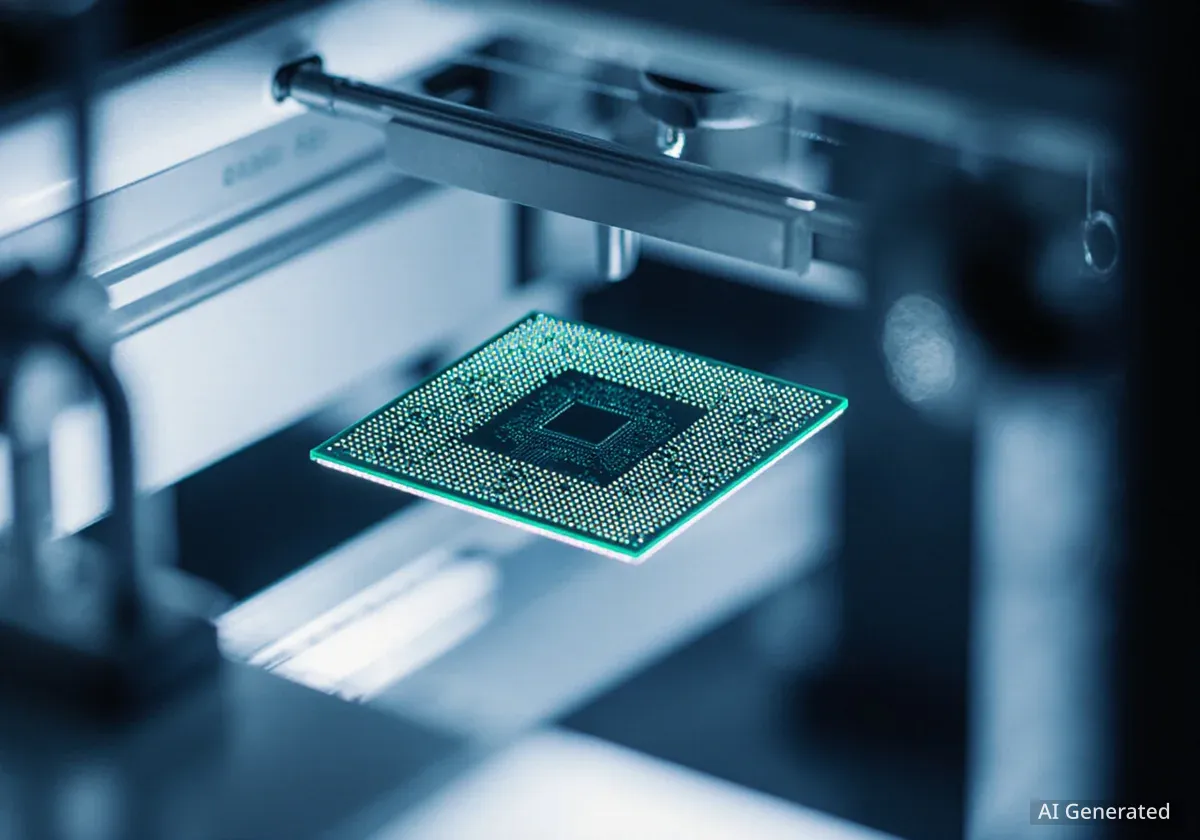Taiwan Semiconductor Manufacturing Company (TSMC), the world's largest contract chip manufacturer, announced a significant 30% year-on-year increase in its third-quarter revenue. This result, which surpassed market expectations, highlights the strong global demand for advanced chips, primarily driven by the expanding artificial intelligence (AI) sector.
The company's performance indicates a robust period of growth, offsetting a previous slowdown in consumer electronics. This surge underscores AI's growing influence across various industries.
Key Takeaways
- TSMC's Q3 revenue rose 30% year-on-year, exceeding forecasts.
- Total revenue reached T$989.92 billion ($32.47 billion).
- Demand for AI applications is the primary growth driver.
- This growth offsets reduced demand for consumer electronics chips.
- TSMC's shares have increased 34% this year.
Third-Quarter Financial Performance Exceeds Projections
TSMC's revenue for the July-September period reached T$989.92 billion, which translates to approximately $32.47 billion. This figure represents a substantial increase compared to T$759.69 billion reported in the same quarter last year.
The reported revenue comfortably exceeded the LSEG SmartEstimate of T$973.26 billion. This estimate was compiled from analyses by 22 financial experts. Furthermore, the results fell within the company's own guidance of $31.8 billion to $33 billion, which TSMC provided in July during its previous earnings call.
"The strong third-quarter results reflect the critical role TSMC plays in the global technology ecosystem, especially with the accelerating adoption of AI technologies," a market analyst commented on the performance.
TSMC typically provides its financial guidance in U.S. dollars. The full third-quarter earnings report, which will include a detailed outlook for the current quarter and the entire year, is scheduled for October 16.
Revenue Highlights
- Q3 2025 Revenue: T$989.92 billion ($32.47 billion)
- Year-on-Year Growth: 30%
- Analyst Forecast (LSEG SmartEstimate): T$973.26 billion
- Company Guidance: $31.8 billion - $33 billion
AI Demand Fuels Chip Industry Growth
The increasing interest in artificial intelligence applications has significantly boosted demand for TSMC's advanced chip products. This trend has been a major factor in the company's strong financial performance.
Major technology firms, including Nvidia and Apple, are among TSMC's key clients. Both companies require high-performance chips for their AI initiatives and other advanced products. Nvidia, in particular, is a leading designer of graphics processing units (GPUs) essential for AI computing.
This growth in AI-driven demand has more than compensated for a decline in orders for chips used in consumer electronics. The tapering off of pandemic-led demand for devices like tablets and personal computers had previously impacted the chip market.
Shifting Market Dynamics
The global semiconductor industry is experiencing a significant shift. While consumer electronics markets saw a boom during the pandemic, that demand has since stabilized. The new primary driver for advanced chip manufacturing is now artificial intelligence.
Companies are investing heavily in AI research and development. This requires specialized processors capable of handling complex computations at high speeds. TSMC's advanced manufacturing capabilities position it well to meet this demand.
About TSMC
TSMC, headquartered in Hsinchu, Taiwan, is the world's largest dedicated independent semiconductor foundry. It manufactures chips for a wide range of customers without designing or marketing its own branded semiconductor products. This business model makes it a critical supplier for nearly all major technology companies globally.
Market Reaction and Broader Industry Impact
TSMC's Taipei-listed shares have seen a positive reaction in the market. The company's stock has gained 34% so far this year. This performance significantly outperforms the broader market, which has recorded an 18.5% rise during the same period.
The strong results from TSMC also reflect a positive trend in the wider technology manufacturing sector. Taiwan's Foxconn, known as the world's largest contract electronics maker, also reported robust sales. Foxconn, a key server manufacturer for Nvidia, achieved its highest-ever revenue for the third quarter.
This indicates a healthy demand across the supply chain for components and systems that support the AI boom. The interconnected nature of the technology industry means that strong performance by a foundational company like TSMC often signals positive trends for its partners and customers.
Global Chip Supply Chain
The semiconductor industry is complex and globally interdependent. TSMC's role as a foundry means it manufactures chips designed by other companies. Its success is therefore closely tied to the demand for advanced technology across various sectors.
The current rise in demand for AI-specific chips is creating new opportunities and challenges for the entire supply chain. Companies are racing to develop more powerful and efficient AI hardware, driving innovation in chip design and manufacturing processes.
Continued investment in research and development, coupled with strategic partnerships, will be crucial for companies like TSMC to maintain their leadership position in this rapidly evolving market.
The currency conversion rate used for these figures is $1 = 30.4880 Taiwan dollars.





